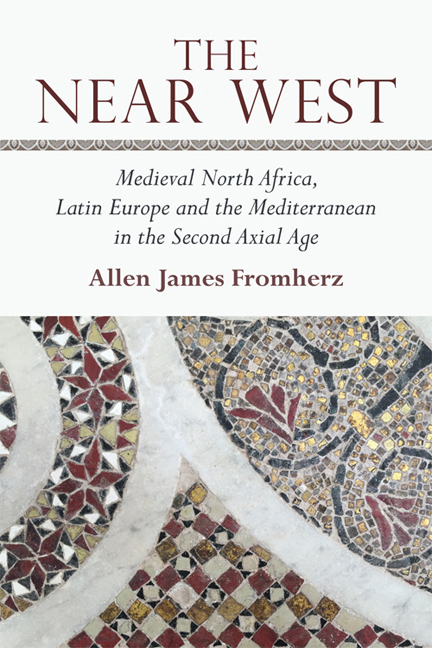Book contents
- Frontmatter
- Contents
- Map: The Near West – Medieval North Africa and Europe
- Personal Note and Acknowledgments
- Introduction: North Africa and the Mediterranean Paradox
- 1 Bèjaïa: Introducing North Africa, Latin Europe and the Mediterranean
- 2 Rome: North Africa and the Papacy
- 3 Tunis: Axis of the Middle Sea
- 4 Marrakech: The Founding of a City
- 5 The Almohads: Empire of the Western Mediterranean
- 6 Between City and Countryside: Ibn Khaldun and the Fourteenth Century
- 7 Conclusions: A Second Axial Age
- Notes
- Bibliography
- Index
6 - Between City and Countryside: Ibn Khaldun and the Fourteenth Century
Published online by Cambridge University Press: 23 September 2017
- Frontmatter
- Contents
- Map: The Near West – Medieval North Africa and Europe
- Personal Note and Acknowledgments
- Introduction: North Africa and the Mediterranean Paradox
- 1 Bèjaïa: Introducing North Africa, Latin Europe and the Mediterranean
- 2 Rome: North Africa and the Papacy
- 3 Tunis: Axis of the Middle Sea
- 4 Marrakech: The Founding of a City
- 5 The Almohads: Empire of the Western Mediterranean
- 6 Between City and Countryside: Ibn Khaldun and the Fourteenth Century
- 7 Conclusions: A Second Axial Age
- Notes
- Bibliography
- Index
Summary
In 1291, a Genoese adventurer named Benedetto Zaccaria, then working for King Sancho IV of Castile, defied all odds and defeated the much larger, but unwieldy fleet of the Berber Marinids, the Almohad successor dynasty in Morocco. Zaccaria would help create an Aragonese and Castilian fleet ready for centuries of naval war and set Christian Spain on a path to dominate waters that were once patrolled by North Africans. This was perhaps as important as the defeat on land of the Almohads by a combined Christian force at the land battle of Las Navas de Tolosa in 1212. The fall of the Almohad and post-Almohad North African fortunes reflected a crisis in late thirteenth- and fourteenth-century North Africa. Of course, much of Europe was also entering a calamitous century. Full of outbreaks of plague, the Hundred Years War, and major fiscal challenges associated with a bubble in trade, the Commercial Revolution and capitalist expansion of the previous centuries seemed to implode.
The situation was increasingly dire for North African shipping in general. After the fall of the Almohads, according to Ibn Khaldun, “Maritime habits were forgotten … The Muslims came to be strangers to the Mediterranean.” By this time Muslim shipping was, compared to the glories of the Almohad past: in tatters. Although the office of the admiralty still existed in Hafsid Tunis in the Zayyanid court and in the Marinid realm, Maghribi shipping activity was largely reduced. The army of the Marinids seemed demoralized by the disastrous battle of Rio Salado in 1340, one of the final major attempts by Marinids to control Iberia. Ibn Khaldun always encouraged continued advances against Christian Iberia; he did not lose all hope. Foreshadowing the rise of the Ottomans, he predicted the rise of a great, new Muslim naval power, a power that would conquer all the lands of the European Christians beyond the sea according to the “books of predictions.”
Yet the polymath, minister and historian Ibn Khaldun (d. 1406) did not give up hope of a more immediate change in affairs. As an ambassador between urban rulers and the tribes of the countryside, Ibn Khaldun realized that new dynasties could arise, take power and set the stage for a new era.
- Type
- Chapter
- Information
- The Near WestMedieval North Africa, Latin Europe and the Mediterranean in the Second Axial Age, pp. 194 - 208Publisher: Edinburgh University PressPrint publication year: 2016



